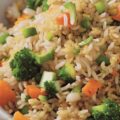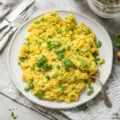For those avoiding gluten for health reasons, finding high-quality gluten-free pasta options can be challenging. Thankfully, many companies now offer gluten-free versions of popular pastas made from ingredients like rice, quinoa, and lentils.
We asked nutrition experts to share their favorite store-bought gluten-free pasta brands and varieties. Read on for 7 great recommendations.
1. Barilla Gluten Free Pasta
Barilla is likely best known for their traditional wheat pastas, but nutritionist Tammy Lakatos Shames, RDN recommends trying their gluten-free rice pastas. “They really nail the texture – it’s al dente and holds up nicely when tossed with sauces,” she says. “Plus they have a variety of gluten-free shapes, including spaghetti, elbows, and penne.”
2. Banza Chickpea Pasta
“My go-to is Banza pasta made from chickpeas! It’s high in protein and fiber, making it very filling,” says Rahaf Al Bochi, RD, owner of Olive Tree Nutrition. She loves Banza’s rotini, spirals, and elbows for holding sauce well. “Banza also has a nice al dente texture and doesn’t get mushy like some gluten-free pastas,” says Rahaf.
3. Ancient Harvest Quinoa Pasta
Ancient Harvest makes pasta using gluten-free quinoa flour. “I like this brand because quinoa provides a complete protein with all 9 essential amino acids making it uniquely positioned among grains,” explains Trista Best, MPH, RD. “This pasta also has 5g of protein per serving and contains 7g of fiber.”
4. Jovial Organic Brown Rice Pasta
“My favorite gluten-free pasta is from Jovial Foods because it tastes the most like traditional pasta,” says Dawn Jackson Blatner, RDN, CSSD. Their pastas are made using just organic brown rice and water for a neutral flavor. Dawn recommends trying their fusilli or penne. “The texture is spot on and it really holds sauce nicely,” she explains.
5. Simply Organic Gluten Free Pasta
Frances Largeman-Roth, RDN and author of Eating in Color likes Simply Organic’s selection of bean-based gluten-free pastas. “They do a great job mimicking wheat pasta’s hearty bite. I’m a fan of their black bean spaghetti – it has a robust 16 grams of protein per serving,” she says. Their elbows, penne, fusilli and lasagne sheets also get her seal of approval.
6. Ronzoni Gluten Free Pasta
Lisa Richards, nutritionist and author of the Candida Diet book names Ronzoni as her top choice. “It has a nice texture and comes in a variety of shapes like penne, rotini and spaghetti. I find the rice and quinoa blends work nicely for holding sauce,” she says. Richards also likes that Ronzoni pastas cook in a similar timing to traditional pasta.
7. Trader Joe’s Gluten Free Pasta
Nutritionist Tina Marinaccio MS, RD, CPT likes Trader Joe’s for budget-friendly gluten-free finds. “Their organic brown rice pasta hits all the marks and cooks up with a pleasant texture. I also appreciate that they offer fun pasta shapes like radiatore and mafalde,” she says. Pastas made with lentils, quinoa or chickpeas are also tasty options.
FAQ
What types of flour are typically used to make gluten-free pasta?
Common gluten-free pasta ingredients include rice flour, corn flour, quinoa flour, chickpea flour or a blend of these options.
Does gluten-free pasta taste different from regular pasta?
There can be some differences in flavor and texture since gluten-free pastas utilize alternative grains. However, many brands now do an excellent job mimicking traditional pasta.
Is gluten-free pasta healthy?
It depends on the ingredients used, but many gluten-free pastas provide extra protein, fiber and other nutrients from beans, lentils, quinoa and brown rice.
Does gluten-free pasta cook the same as regular pasta?
Most brands provide suggested cook times since gluten-free varieties can cook slightly faster. Be sure not to overcook or the pasta may become mushy.
Can you mix gluten-free and regular pasta in a dish?
It’s best not to mix them since even small amounts of gluten can cause issues for those with celiac disease or gluten sensitivity.









